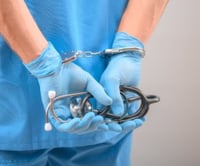 "Physicians suffer Imposter Syndrome more than other US Workers"
"Physicians suffer Imposter Syndrome more than other US Workers"
A headline that has every doctor and nurse nodding their head in agreement and my personal "DUH of the Week" in healthcare industry news.
Fortunately, the authors put together some pretty good recommendations for action steps in the end. Check it out.
A new study from Tait Shanafelt MD, et al at Stanford is out:
Imposter Phenomenon in US Physicians Relative to the US Working Population
SYNOPSIS:
The researchers conducted a national survey of roughly 3,000 physicians between the ages of 29 and 65. In the survey, physicians ranked four statements on a 5-point scale, from “not at all” to “very true.” The statements expressed thoughts related to burnout, professional fulfillment, self-valuation and suicide.
Based on the participants’ rankings, the study authors found that 1 in 4 physicians experienced frequent or intense imposter syndrome symptoms. (bolds are mine)
AND Stronger feelings of imposter syndrome bring greater risk of occupational burnout, suicidal thoughts and professional unfulfillment.
We All Know This is True and remember how it started way back in Medical School.
The inner voice says, "What if they find out?"
... and you are off to the Shame and Guilt Olympics.
============
Learn More from Our 40,000 Doctor Experience:
The simplest way to prevent physician burnout
Live Burnout Prevention Training
Burnout's highest and best use
Meet our team of certified physician coaches
The fast track to a much better job
============
IMPOSTER SYNDROME Drives Burnout
Imposter Syndrome is a core component of the programming / conditioning of our medical education. The inner voice of "what if they find out" slides right into the lineup of our workaholic, perfectionist, Lone Ranger personality traits. Together these features of our inner reality are responsible for our outstanding performance and resilience and our higher risk of burnout.
Imposter Syndrome is the core reason doctors
- Don't take good care of themselves
- Or ask for help
- Or recognize their own burnout
Imposter Syndrome is the basis for the 2nd Prime Directive of Healthcare:
#1) The First Prime Directive is conscious and universal.
You know it as:
"The Patient Comes First"Quick Question:
If the patient always comes first, where do you come in this pecking order?
#2) The Second Prime Directive is way more powerful and mostly subconscious. It handcuffs our ability to care for our own physical and emotional needs.
It's the little voice that says,

"Never Show Weakness".- Never let ANYONE think that you don't have what it takes.
- Never complain or ask for a break.
- Always take on extra work and complete every task no matter how onerous, useless or ridiculous.
Imposter Syndrome is everywhere, all the time.
And yet, it doesn't have to be this way.
Here are some recommendations from the study we can say AMEN to.
We have been teaching these concepts to physicians, leaders and healthcare organizations since the launch of TheHappyMD.com back in 2010!
"The authors recommend ways medical organizations can mitigate imposter syndrome in the workplace, including fostering a culture that allows physicians to express vulnerability and sharing personal stories in small group discussions. (~ AMEN)
Particularly, the authors note, experienced physicians, who often appear to have it all together, can describe their own “failure resumes” for junior colleagues to demonstrate that role models also have difficulties. De-stigmatizing and normalizing help-seeking could also contribute to more professional fulfillment, the authors state in the paper.
(~ We teach this as "Tell Your Own Story First, the GOOD, the BAD and the UGLY")With the help of a professional coach, individual physicians can tackle imposter syndrome symptoms, by reframing their thoughts and learning to recognize their accomplishments and acknowledge that they are due to their hard work, skill and ability.
( Our Team of Certified Physician Burnout Coaches is HERE )“The best thing we can do is to embrace the physician as a human rather than as simply a hero.” (~ AMEN)
Article:
Physicians experience imposter syndrome more often than other U.S. workersThe Study:
Imposter Phenomenon in US Physicians Relative to the US Working Population
===================
PLEASE LEAVE A COMMENT
What does your inner voice say when you notice imposter syndrome?
Does this study finding of 25% of US doctors surprise you?

